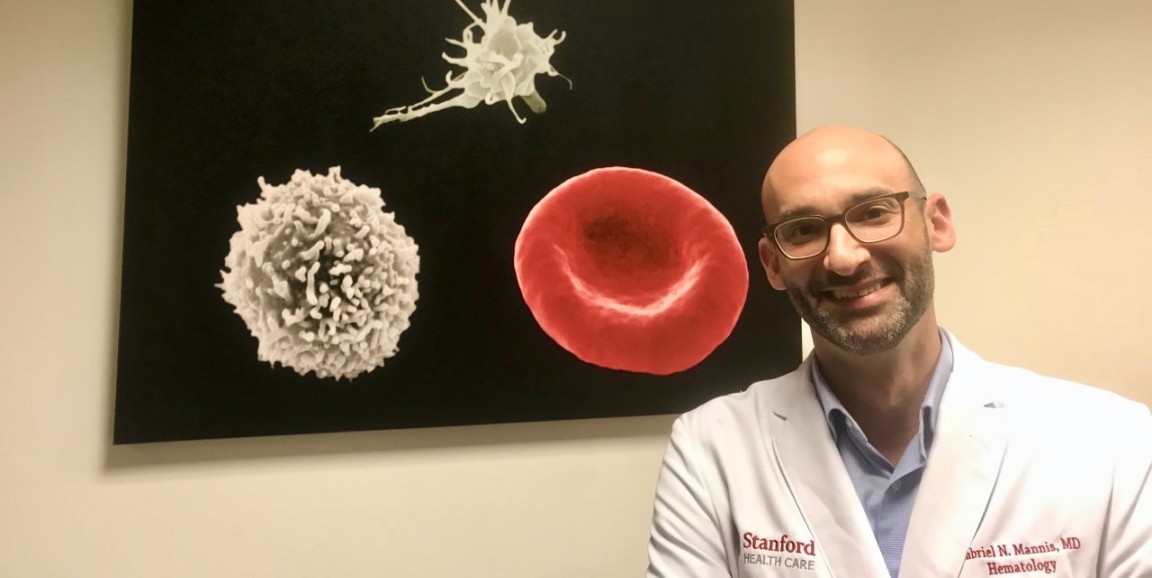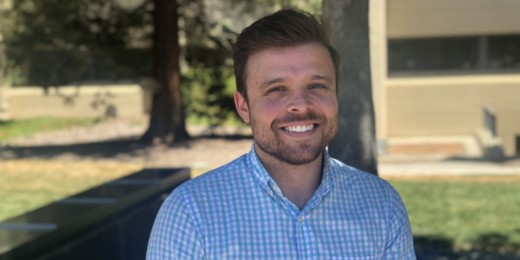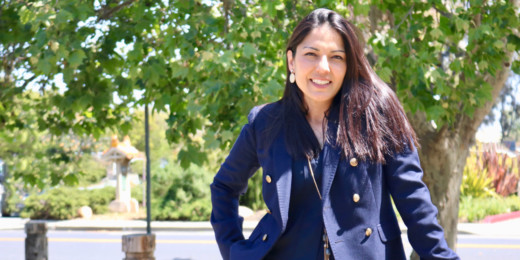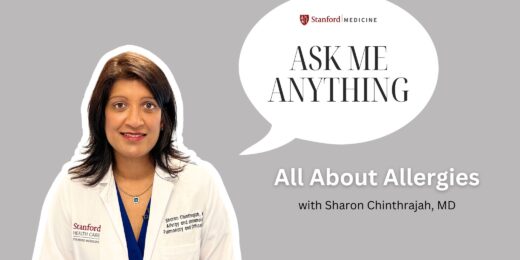My interview with Gabriel Mannis, MD, assistant professor of hematology, was interrupted twice. First when he received an urgent message as an on-call physician, and 20 minutes later when a nurse dropped in to consult on a patient. Mannis handled the interruptions with good nature and patience -- useful traits for a young academic physician who juggles patient care, research and clinical trials for acute leukemia.
I sat down with Mannis to ask about his first four months at Stanford -- and if he could tell me how to get to Sesame Street, where he worked for two years.
It was pretty clear early on that I was a science nerd. I competed in National Science Olympiad -- actually, I competed against my now wife when we were still in middle school. My dad is a physician (ophthalmologist) and I had a sense that medicine was something that I might be interested in.
I liked a lot of different things: infectious disease, critical care, hematology, palliative care and primary care. In the end, hematology allowed me to do all of those things. For patients with acute leukemia, I often become their de facto primary care doctor. They unfortunately can get really sick, so I may end up seeing them in the intensive care unit, and because they're immunocompromised they can get the craziest infectious diseases. I also do a lot of end-of-life care because, unfortunately, many of my patients die from their disease. But then there are also the patients I help cure of their cancer.
I went to med school at UC Davis and did my internal medicine residency at UC San Francisco. I stayed at UCSF for a three-year fellowship and was board certified in both hematology and oncology. I did an extra year of research after receiving a grant to continue the work I started in fellowship, and then I stayed on as faculty at UCSF for a little over four years.
What's cool about my job is that there's not really a typical day. As a clinical scientist, I get to do it all. I see patients a few days a week and the other days I'm working on research -- predominately clinical trials. I also do a lot of teaching and interact regularly with the fellows, residents and med students.
One of the trials I'm excited about is for an antibody that targets CD47; it's basically a checkpoint inhibitor that enhances the immune system's ability to fight off blood cancers. It's a drug that was developed here at Stanford by Ravi Majeti, MD, PhD, and Irv Weissman, MD. I'm really excited to be able to bring these kinds of novel, homegrown drugs to patients.
My parents. My father was an academic physician, and I remember him at my Little League games with a stack of journals, only taking a break from them when I was up to bat. He'd have his fellows and residents over to our house for dinner and I'd see him get excited about teaching and research. My mom was mostly a stay-at-home mom when I was growing up, and I attribute a lot of my instinct to take care of people to her.
After college, I worked as a production assistant intern on the international versions of Sesame Street. For Sesame Street franchises throughout the world, about half of the material is purchased from the American version and dubbed over. But any of the live action street scenes with people and puppets need to be culturally appropriate and so is written in the country of origin. Any material that's written and produced in a foreign country gets sent to the New York headquarters to be reviewed by a team to make sure it's consistent with Sesame Street's mission of education, tolerance, humor and entertainment.
Having more or less learned how to read and count by watching Sesame Street as a kid, I enjoyed the sense that I was perhaps contributing in a small way to the education of future generations around the world. I also learned that I didn't love working in a regular office doing the same thing every day, and that I needed more direct interaction with the people I was interested in helping. It seems weird in retrospect, but those insights from my time at Sesame Street were probably invaluable in leading me to a career in academic medicine with a focus in clinical cancer research.
Two pieces of advice have stuck with me. One is that every person you work with can teach you something -- whether that's something you want to emulate or something you want to not emulate. The second piece of advice that I got from an early mentor is that, if you start a project, finish it. It's easy to have a brilliant idea and start something, but it's getting across the finish line that separates people who are good at something and who are great.
Photo by Jonathan Wosen






